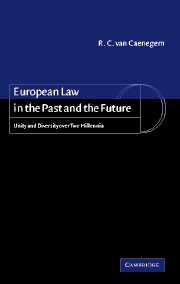Book contents
- Frontmatter
- Contents
- Preface
- 1 The national codes: A transient phase
- 2 Ius commune: The first unification of European law
- 3 Common law and civil law: Neighbours yet strangers
- 4 The holy books of the law
- 5 Why did the ius commune conquer Europe?
- 6 Law is politics
- Epilogue: A look into the twenty-first century
- Bibliography
- Index
2 - Ius commune: The first unification of European law
Published online by Cambridge University Press: 06 August 2009
- Frontmatter
- Contents
- Preface
- 1 The national codes: A transient phase
- 2 Ius commune: The first unification of European law
- 3 Common law and civil law: Neighbours yet strangers
- 4 The holy books of the law
- 5 Why did the ius commune conquer Europe?
- 6 Law is politics
- Epilogue: A look into the twenty-first century
- Bibliography
- Index
Summary
TRIBES AND NATION STATES
In present-day Europe the basic nineteenth-century situation still prevails. On the Continent the codes have survived and the nation states are still going strong: ‘one nation, one state, one code of law’ describes it well enough. The same can be said of the uncodified English common law, whose hold on the country is still powerful. Law students of my generation, who had never heard of a European Commission, a European Parliament or European courts in Luxemburg and Strasbourg, took these monolithic national systems for granted. The most striking example could be found in the over-centralized France of the nineteenth century. Private law was based on one civil code and one code of civil procedure, which had formally replaced all previous norms and were valid for the whole territory. There was one tightly controlled network of Law Faculties where the one Code civil was taught under the supervision of one Ministry of Education. There was one Department of Justice to supervise the workings of the courts and one Court of Cassation, in Paris of course, to ensure the application of the one code and the uniformity of its interpretation. There was one body of jurisprudence, with a limited number of eminent professors who wrote authoritative treatises (sometimes called ‘elementary’ in spite of their containing numerous volumes) and all belonged to the one Ecole de l'Exégèse (on which more in chapter 4).
- Type
- Chapter
- Information
- European Law in the Past and the FutureUnity and Diversity over Two Millennia, pp. 22 - 37Publisher: Cambridge University PressPrint publication year: 2001



